鸟啼原文
精品散文:《鸟啼》【英】劳伦斯

严寒持续了好几个星期,鸟儿很快地死去了。
田间与灌木篱下,横陈着田凫、椋鸟、画眉等数不清的腐鸟的血衣,鸟儿的肉已被隐秘的老饕吃净了。
突然间,一个清晨,变化出现了。
风刮到了南方,海上飘来了温暖和慰藉。
午后,太阳露出了几星光亮,鸽子开始不间断地缓慢而笨拙地发出咕咕的叫声。
这声音显得有些吃力,仿佛还没有从严冬的打击下缓过气来。
黄昏时,从河床的蔷薇棘丛中,开始传出野鸟微弱的啼鸣。
当大地还散落着厚厚的一层鸟的尸体的时候,它们怎么会突然歌唱起来?从夜色中浮起的隐约的清越的声音,使人惊讶。
当大地仍在束缚中时,那小小的清越之声已经在柔弱的空气中呼唤春天了。
它们的啼鸣,虽然含糊,若断若续,却把明快而萌发的声音抛向苍穹。
冬天离去了。
一个新的春天的世界。
田地间响起斑鸠的叫声。
在不能进入的荆棘丛底,每一个夜晚以及每一个早晨,都会闪动出鸟儿的啼鸣。
它从哪儿来呀?那歌声?在这么长的严酷后,鸟儿们怎么会这么快就复生?它活泼,像泉水,从那里,春天慢慢滴落又喷涌而出。
新生活在鸟儿们喉中凝成悦耳的声音。
它开辟了银色的通道,为着新鲜的春日,一路潺潺而行。
当冬天抑制一切时,深埋着的春天的生机一片沉默,只等着旧秩序沉重的阻碍退去。
冰消雪化之后,顷刻间现出银光闪烁的王国。
在毁灭一切的冬天巨浪之下,蛰伏着的是宝贵的百花吐艳的潜力。
有一天,黑色的浪潮精力耗尽,缓缓后移,番红花就会突然间显现,胜利地摇曳。
于是我们知道,规律变了,这是一片新的天地,喊出了崭新的生活!生活!不必再注视那些暴露四野的破碎的鸟尸,也无须再回忆严寒中沉闷的响雷,以及重压在我们身上的酷冷。
冬天走开了,不管怎样,我们的心会放出歌声。
即使当我们凝视那些散落遍地、尸身不整的鸟儿腐烂而可怕的景象时,屋外也会飘来一阵阵鸽子的咕咕声,那从灌木丛中发出的微弱的啼鸣。
那些破碎不堪的毁灭了的生命,意味着冬天疲倦而残缺不全的队伍的撤退。
我们耳中充塞的,是新生的造物清明而生动的号音,那造物从身后追赶上来,我们听到了鸟儿们发出的轻柔而欢快的隆隆鼓声。
《鸟啼》精品课件
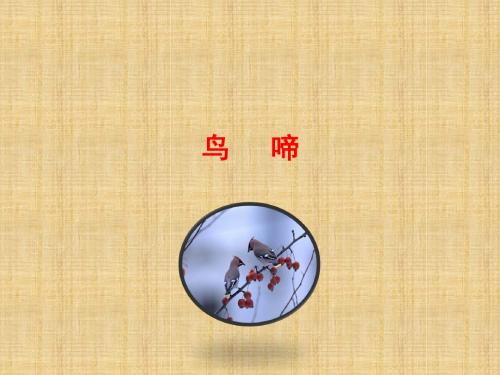
【提示】这里的描写融入了作者强烈的主观感情,
“轻柔而欢快”是鸟叫的客观特点,“隆隆鼓声”
是一种具有象征性的比喻,在作者心中,这初春的
鸟叫便是春天向残冬宣战的战鼓。
(2)月桂树总要飘出花香,绵羊总要站立舞蹈,白
屈菜总要遍地闪烁,那就是新的天堂和新的大地。
【提示】这些都是生机的象征,它们是新生的代表。
鸟
啼
关于鸟啼的诗词有很多:
春眠不觉晓,处处闻啼鸟。
一叫一回肠一断。
欲啭不啭意自娇,羌儿弄笛曲未调。 恨别鸟惊心。 最好声音最好听,似调歌舌更叮咛。 今天,我们一起来学习一下外国 作家劳伦斯笔下的《鸟啼》。
1.了解作家知识,整体感知,把握 文章的行文思路和基本内容。 2.通过朗读,体会作者围绕中心描 写场景和形象,安排议论和抒情的 方法。
蛰伏:①动物冬眠,潜伏起来不食不动。②借指蛰居。
摇曳:摇荡。
隐遁:隐居避世。文中指消失。
残骸: 人或动物的尸骨,借指残破的建筑物、机
械、车辆等。 势不可挡:来势迅猛,不可抵挡。
阅读课文,整体感知文意。 【提示】全文共15段,划分为两部分: 第一部分(第1~5段):主要写严寒过后,春 天来临,鸟儿啼鸣。 第二部分(第6~15段):侧重写鸟的啼鸣给 人类的启示,写“我们”的思考。
1.了解作者 劳伦斯(1885—1930),20世纪 英国最独特和最富争议的作家。 主要作品:《虹》《查泰莱夫人
的情人》《恋爱中的女人》等。
劳伦斯是一位性格十分复杂,
内心充满苦闷,对现代工业文明持
批判和否定态度,致力于揭示人性
中的本能力量,对人性能够得到充
分的自由发挥怀着憧憬的作家。
他的散文是一个孤独者在他那
【课件】苏教版高中语文必修二课件:第一专题《鸟啼》(共16张PPT) - 最新

• (英)劳伦斯
鸟鸣涧
王维
人闲桂花落, 夜静春山空。 月出惊山鸟, 时鸣春涧中。
在这个寂无人声的地方,芬芳的桂花轻轻飘落 在地上。静静的夜晚,使这春天的山林更加空 寂。月亮升起,惊动了正在树丛栖息的山鸟, 它们清脆的叫声在空旷的山涧中不时地传响。
关于鸟啼的古诗
• 春眠不觉晓,处处闻啼鸟。 • 一叫一回肠一断,三春三月忆三巴。 • 欲啭不啭意自娇,羌儿弄笛曲未调。 • 感时花溅泪,恨别鸟惊心。 • 蝉噪林逾静,鸟鸣山更幽。
合作探究
1.通过鸟啼的启示,劳伦斯做 了怎样的思考?找出相关语句 并结合自己观点表达。
• 如:
• 12节:“生命和死亡全不相容。死时,生便不存在,皆 是死亡,犹如பைடு நூலகம்场势不可挡的洪水。继而,一股新的浪 头涌起,便全是生命,便是银色的极乐的源泉。”
• 提炼的观点:1、生死不容,死则无生,生则无死,死 中必生;
理 质,描写了矿工家庭的困苦生活。他的作品
解 还有长篇小说《虹》、《迷途的姑娘》、短
片小说集《英国,我的英国》。
整体感知 解读文本
1.请给文章划分层次,思考作者行文先 写了什么?后写了什么?
2.默读课文,找出文中描写鸟啼的语句 ,并概括出它的特点。(找出关键词)
3.这是什么时节的鸟鸣?在写鸟啼 之前,作者还写了什么,能否用简 洁的语言概括?有何含义作用?
作
者 劳伦斯(1885—1930),英国作家。他
点 生在诺丁汉郡一个矿工家庭,曾在诺丁汉大
击
学学习师范教育,当过会计、职员、教师, 曾在英国各地以及其他一些国家漂泊十余年,
加
广泛接触了社会。1909年开始发表诗歌。 1911年出版第一部长篇小说《白孔雀》。成
啼鸟原文-翻译及赏析
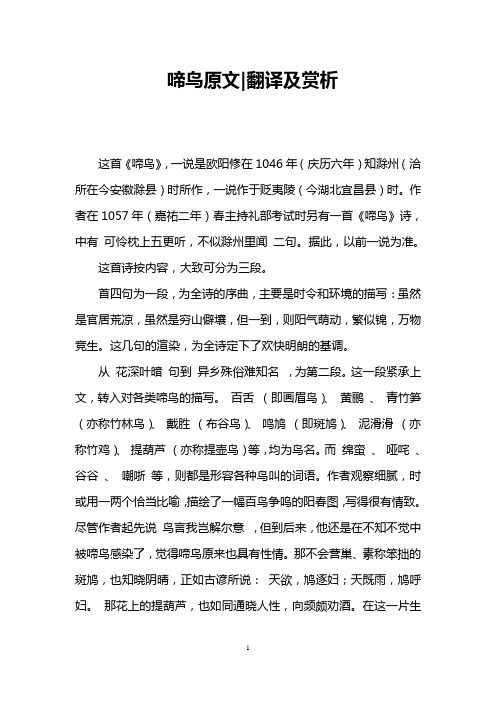
啼鸟原文|翻译及赏析这首《啼鸟》,一说是欧阳修在1046年(庆历六年)知滁州(洽所在今安徽滁县)时所作,一说作于贬夷陵(今湖北宜昌县)时。
作者在1057年(嘉祐二年)春主持礼部考试时另有一首《啼鸟》诗,中有可怜枕上五更听,不似滁州里闻二句。
据此,以前一说为准。
这首诗按内容,大致可分为三段。
首四句为一段,为全诗的序曲,主要是时令和环境的描写:虽然是官居荒凉,虽然是穷山僻壤,但一到,则阳气萌动,繁似锦,万物竞生。
这几句的渲染,为全诗定下了欢快明朗的基调。
从花深叶暗句到异乡殊俗难知名,为第二段。
这一段紧承上文,转入对各类啼鸟的描写。
百舌(即画眉鸟)、黄鹂、青竹笋(亦称竹林鸟)、戴胜(布谷鸟)、鸣鸠(即斑鸠)、泥滑滑(亦称竹鸡)、提葫芦(亦称提壶鸟)等,均为鸟名。
而绵蛮、哑咤、谷谷、嘲哳等,则都是形容各种鸟叫的词语。
作者观察细腻,时或用一两个恰当比喻,描绘了一幅百鸟争呜的阳春图,写得很有情致。
尽管作者起先说鸟言我岂解尔意,但到后来,他还是在不知不觉中被啼鸟感染了,觉得啼鸟原来也具有性情。
那不会营巢、素称笨拙的斑鸠,也知晓阴晴,正如古谚所说:天欲,鸠逐妇;天既雨,鸠呼妇。
那花上的提葫芦,也如同通晓人性,向频颇劝酒。
在这一片生机盎然的气氛之中,遭贬谪的诗人的感想,就是下文要描叙的内容。
从我遭谗口句到最后,是全诗的第三段,同时也是全诗的主旨所在。
作者笔锋一转,由鸟及人。
所谓我遭谗口,是指1045年(庆历五年)有人谣传作者和留养在家的孤甥张氏有不正当的关系这件事。
此事后来虽经辩明,但欧阳修却终于因此降官,出知滁州。
他既遭此诬陷,在政治斗争中又曾多次为流言中伤,所以他每闻那些如簧之巧舌(不管是人言,还是鸟语),僧恶之心,即时生起。
然而,山城寂寞,美人歌舞全无(娉婷代指美女,此处代指能唱歌善舞的乐妓)。
诗人无法消磨时光,于是只好以酒浇愁,醉与花鸟为朋(交朋,另一版本作友朋)。
因为花能嫣然顾我笑,鸟劝我饮非无情,这种拟人的手法,不管是诗人醉后的想象,还是诗人聊以自慰之语,反正到了这两句,人和物已经融为一体,作者的心境已经由激动而归于平静。
鸟啼
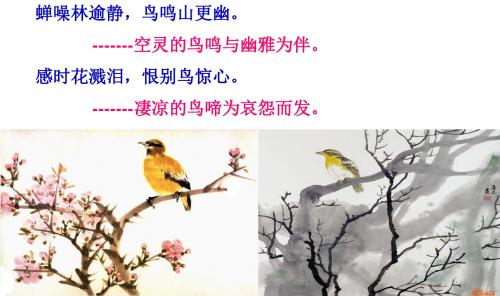
第6节: 春天的充满生机的种子深埋在冬天的岁月 之中,再冷酷的严冬里,都蛰伏着生命的潜力。 一旦严冬过去春天来临,生命就会爆发活力, 蓬勃生长。 如果冬天来了,春天还会远吗? ------雪莱
讨论:劳伦斯对于生命与死亡的思考 • (1)生——生命的力量是不可阻挡的,生命的冲动是 无法遏制的。 • (2)死——不必畏惧死亡和痛苦,我们要坦然面对死 亡。 • (3)生与死——生与死全不相容,二者不可兼得,但 生又孕育着死,死又孕育着生; 要向死而生。
黄昏 夜色
生 命 越 来 越 强 烈
响起斑鸠的叫声;闪动 出鸟儿的啼鸣;
活泼,像泉水,从那里,春 天慢慢滴落又喷涌而出 悦耳
关键词二:
思考
找出文中两次聆听引发作者两次 思考的文字。
第3节:“当大地还散落着厚厚的一层鸟的尸体的时候, 它们怎么会突然歌唱起来的呢?” 第5节:“它从哪儿来呀,那歌声?在这么长的严酷之 后,鸟儿们怎么会这么快就复生?” 作者的思考: 经历了死亡的时节,鸟儿们怎么会这么快就复生? 它们的生命的种子埋在哪里?
老饕
慰藉 攫住 潺潺
炽热
蛰伏
充塞
关键词一: 聆听
找出文中集中描写“鸟啼”的文 字,并概括“鸟啼”的特点。
画眉
椋鸟
大野 鸽
斑鸠
田凫
还 没 有 从 严 冬 的 打 击 下 缓 过 来
冬 天 离 去 了
午后
鸽子:缓慢而笨拙地发 出咕咕的叫声
传出野鸟微弱的啼叫 浮起的隐约而清越的声 音,使人惊讶
吃力 微弱 隐约而清 越
蝉噪林逾静,鸟鸣山更幽。
-------空灵的鸟鸣与幽雅为伴。
感时花溅泪,恨别鸟惊心。
-------凄凉的鸟啼为哀怨而发。
高中语文鸟啼ppt36 苏教版最新优选公开课件
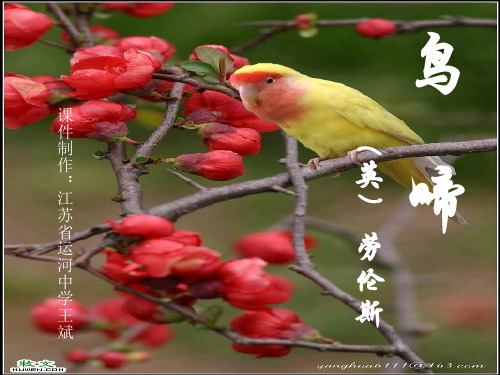
议论
6~10 11
12~15
生命的冲动不可阻挡 生命由何而来 向死而生
研习文本(1)
(1)找出文章开始对鸟儿死亡场景 的描写,这样写有什么作用?
鸟儿死亡场景让人倍感凄凉, 然而在天气转暖之后,鸟儿不停地 啼鸣,呼告了一个春天新世界的到 来,显示了一种生命本身的张力。 作者把鸟尸与鸟啼进行对比,更加 肯定了生命力量的不可阻挡。
基 (不得改变原意)
积
享受黄昏,轻轻地,静静地,品一盅
累 酒,画了幅画,唱唱歌,写一首诗,想起
了张面孔,看一只鸢影掠空,冷静地把自
语
己的心事掏出来梳理。这时,美妙的大自 然就会把一个纯真无邪,无忧无虑的你还
言 给自己。
表 答:画一幅画,唱一支歌,写一首 达 诗,想起一张面孔,看一只鸢影掠
空。
联系生活,发现生活美、自 然美。
劳伦斯(1885—1930),英国作家。他生在诺
点 丁汉郡一个矿工家庭,曾在诺丁汉大学学习师范 教育,当过会计、职员、教师,曾在英国各地以
击 及其他一些国家漂泊十余年,广泛接触了社会。 作 1909年开始发表诗歌。1911年出版第一部长篇小 者 说《白孔雀》。成名作长篇小说《儿子和情人》,
带有自传性质,描写矿工家庭的困苦生活。他的
隐约、含糊、时断时续 第二类 • 清越、明快、悦耳、清明、
生动、轻柔、欢快
•这两类鸟啼在什 么情境下发出的? 有什么内涵?
第一类鸟啼的背景
• 严寒持续了好几个星期,很多鸟惨死 • 太阳露出几星光亮,黄昏时,河床的蔷
薇棘从
• 空气柔弱;黑色的浪潮精力耗尽缓缓后 移
• 漫长的冬天,封冰昨天才开裂
第二类背景
学习目标:
《鸟啼》自读指导与练习
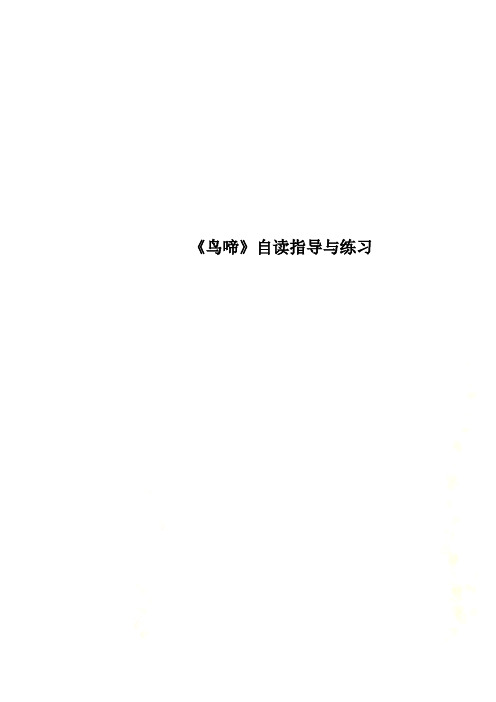
《鸟啼》自读指导与练习《鸟啼》自读指导与练习一、指导阅读:本文是英国诗人、小说家、散文家劳伦斯的一篇散文。
文章通过描写严冬消逝、春天来临之际鸟儿的啼鸣,表达了作者对生与死的思考和对生命神奇的由衷赞美。
鸟儿的啭鸣其目的指向是生命的欲望:创造新生而不是沉湎于死亡,鸟啼这一动物的本能行为由此获得了意义的升华。
作者介绍劳伦斯·大卫·赫伯特(1885-1930),英国作家。
生在诺丁汉郡一个矿工家庭,曾在诺丁汉大学学习师范教育。
当过会计、职员、教师,曾在英国各地以及其他一些国家漂泊十余年,广泛接触了社会。
1911年出版第一部长篇小说《白孔雀》。
成名作是长篇小说《儿子和情人》(1913),还有《虹》(1915)、《恰特莱夫人的情人》(1928)中更加鲜明。
他的作品还有长篇小说《迷途的姑娘》(1920)、《恋爱中的女人》(1921)等。
文章脉络,全文分为两部分:第1至5节,主要写严寒过后,春天来临,鸟儿的啼鸣。
第6至15节,侧重写鸟儿啼鸣给人类的启示,写“我们”的思考。
二、自读练习1、加点字注音1、结合文章内容,思考作者在文章中表达了怎样的生活信念?2、本文是一篇优美的说理性散文,用了很多表现手法,试举几例说明。
答案二、1、fúliángtāojièqiángwēifùjiūjí2、潺潺蛰伏隐遁窒息攫住昊天3、I (1)表现冬天的严酷和春天的生机的顽强。
(2)指生机盎然的春天的世界。
(3)指由冬天抑制着春天到春天战胜了冬天。
(4)春天战胜了冬天,正是鸟开始啼唱的季节,而鸟的啼唱又是春天的旋律。
II (1)走出漫长冬天以后的喜悦和欢快。
(2)A残暴的冬天曾给我们到来沉重的毁灭般的打击。
B冬天曾使我们遭受难以摆脱的痛苦。
(3)具有顽强的生命力,永远不会被冬天征服,一到春天就会洋溢着蓬勃的生命活力。
三、1、文章通过描写严冬消逝、春天来临之际鸟儿的啼鸣,表达了作者对生与死的思考和对生命神奇的由衷赞美。
鸟啼_课件
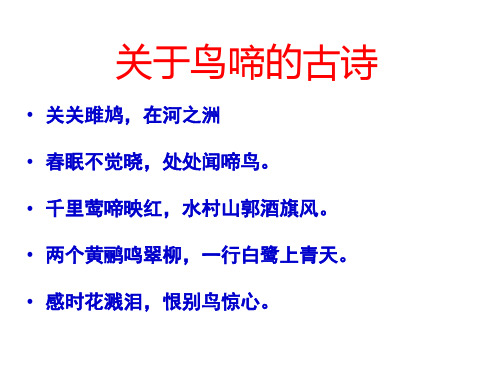
腐烂 鸟尸
鸟啼
冬 象征 死亡 世界不可选择
天
反
衬
春 天
象征
新生 春天不可抑制
向死而生
生命中充满着神奇的力量 关于生命的顽强 关于生命的不可抑制的力量, 在你的人生阅历中, 有过这样的发现和体会吗?
海伦·凯勒:
地一手却死
狱本电无神
便书筒法可
改 变 了 模
一 束 光
的 光 是 黑
折 断 她 思
以 拧 断 钢
样 夜想筋
……
里的
未翅
熄膀
的
太
阳
生如夏花之绚烂,死如秋叶之静美。
——泰戈 尔
以笑的方式哭,在死亡的伴随下活着。
—— 余华
珍爱生命 礼赞生命
向死而生
布置作业
• 课外练笔: • 以“谛听天籁”为话题,写一则不少于500
关于鸟啼的古诗
• 关关雎鸠,在河之洲 • 春眠不觉晓,处处闻啼鸟。 • 千里莺啼映红,水村山郭酒旗风。 • 两个黄鹂鸣翠柳,一行白鹭上青天。 • 感时花溅泪,恨别鸟惊心。
鸟
( 英
啼
)
劳
伦
斯
劳伦斯(1885—1930),英国作家。他生在一个矿
工家庭,曾在英国各地以及其他一些国家漂泊十余年, 广泛接触了社会。成名作长篇小说《儿子和情人》, 带有自传性质,描写矿工家庭的困苦生活。他的作品 还有长篇小说《虹》《查泰莱夫人的情人》。
研习文本1-5节
• 本文题为《鸟啼》,文中哪些段落集中 描写了鸟啼?
• 找出文中描写鸟啼的句子。
鸟啼声特点?
不间断地 缓慢而笨拙 吃力 微弱
- 1、下载文档前请自行甄别文档内容的完整性,平台不提供额外的编辑、内容补充、找答案等附加服务。
- 2、"仅部分预览"的文档,不可在线预览部分如存在完整性等问题,可反馈申请退款(可完整预览的文档不适用该条件!)。
- 3、如文档侵犯您的权益,请联系客服反馈,我们会尽快为您处理(人工客服工作时间:9:00-18:30)。
鸟啼原文WHISTLING OF BIRDSD. H. LawrenceThe frost held for many weeks, until the birds were dying rapidly. Everywhere in the fields and under the hedges lay the ragged remains of lapwings, starlings, thrushes, redwings, innumerable ragged, bloody cloaks of birds, whence the flesh was eaten by invisible beasts of prey.Then, quite suddenly, one morning, the change came. The wind went to the south, came off the sea warm and soothing. In the afternoon there were little gleams of sunshine, and the doves began, without interval, slowly and awkwardly to coo. The doves were cooing, though with a laboured sound, as if they were still winter-stunned. Nevertheless, all the afternoon they continued their noise, in the mild air, before the frost had thawed off the road. At evening the wind blew gently, still gathering a bruising quality of frost from the hard earth. Then, in the yellow-gleamy sunset, wild birds began to whistle faintly in the blackthorn thickets of the stream-bottom.It was startling and almost frightening, after the heavy silence of frost. How could they sing at once, when the ground was thickly strewn with the torn carcasses of birds? Yet out of the evening came the uncertain, silvery sounds that made one’s soul start alert, almost with fear. How could the little silver bugles sound the rally so swiftly, in the soft air, when the earth was yet bound? Yet the birds continued their whistling, rather dimly and brokenly, but throwing the threads of silver, germinating noise into the air.It was almost a pa in to realize, so swiftly, the new world. “Le monde est mort.Vive le monde!” But the birds omitted even the first part of the announcement, their cry was only a faint, blind, fecund “vive!”There is another world. The winter is gone. There is a new world of spring. The voice of the turtle is heard in the land. But the flesh shrinks from so sudden a transition. Surely the call is premature, while the clods are still frozen, and the ground is littered with the remains of wings! Yet we have no choice. In the bottoms of impenetrable blackthorn, each evening and morning now, out flickers a whistling of birds.Where does it come from, the song? After so long a cruelty, how can they make it up so quickly? But it bubbles through them, they are like little well-heads, little fountain-heads whence the spring trickles and bubbles forth. It is not of their own doing. In their throats the new life distils itself into sound. It is the rising of the silvery sap of a new summer, gurgling itself forth.All the time, whilst the earth lay choked and killed and winter-mortified, the deep undersprings were quiet. They only wait for the ponderous encumbrance of the old order to give way, yield in the thaw, and there they are, a silver realm at once. Under the surge of ruin, unmitigated winter, lies the silver potentiality of all blossom. One day the black tide must spend itself and fade back. Then all-suddenly appears the crocus, hovering triumphant in the year, and we know the order has changed, there is a new regime, sound of a ne w “Vive! Vive!”It is no use any more to look at the torn remnants of birds that lie exposed. It is no longer any use remembering the sullen thunder of frost and the intolerable pressure of cold upon us. For whether we will or not, they are gone. The choice is not ours. We many remain wintry and destructive for a little longer, if we wish it, but the winter is gone out of us, and willy-nilly our hearts sing a little at sunset.Even whilst we stare at the ragged horror of birds scattered broadcast, part-eaten, the soft, uneven cooing of the pigeon ripples from the outhouses, and there is a faint silver whistling in the bushes come twilight. No matter, we stand and stare at the torn and unsightly ruins of life, we watch the weary, mutilated columns of winter retreating under our eyes. Yet in our ears are the silver vivid bugles of a new creation advancing on us from behind, we hear the rolling of the soft and happy drums of the doves.We may not choose the world. We have hardly any choice for ourselves. We follow with our eyes the bloody and horrid line of march of this extreme winter, as it passes away. But we cannot hold back the spring. We cannot make the birds silent, prevent the bubbling of the wood-pigeons. We cannot stay the fine world of silver-fecund creation from gathering itself and taking place upon us. Whether we will or mo, the daphne tree will soon be giving off perfume, the lambs dancing on two feet, the celandines will twinkle all over the ground, there will be new heaven and new earth.For it is in us, as well as without us. Those who can may follow the columns of winter in their retreat from off the earth. Some of us, we have no choice, the spring is within us, the silver fountain begins to bubble under our breast, there is a gladness in spite of ourselves. And on the instant we accept the gladness! The first day of change, out whistles an unusual, interrupted pean, a fragment that will augment itself imperceptibly. And this in spite of the extreme bitterness of the suffering, in spite of the myriads of torn dead.Such a long, long winter, and the frost only broke yesterday. Yet it seems, already, we cannot remember it. It is strangely remote, like a far-off darkness. It is as unreal as a dream in the night. This is the morning of reality, when we are ourselves. This is natural and real, the glimmering of a new creation that stirs in us and about us. We know there was winter, long, fearful. We know the earth was strangled and mortified, we know the body of life was torn and scattered broadcast. But what is this retrospective knowledge? It is something extraneous to us, extraneous to this that we are now. and what we are, and what, it seems, we always have been, is this quickening lovely silver plasm of pure creativity. All the mortification and tearing, ah yes, it was upon us, encompassing us. It was like a storm or a mist or a falling from a height. It was entangled upon us, like bats in our hair, driving us mad. But it was never really our innermost self. Within, we were always apart, we were this, this limpid fountain of silver, then quiescent, rising and breaking now into the flowering.It is strange, the utter in compatibility of death with life. Whilst there is death, life is not to be found. It is all death, one overwhelming flood. And then a new tide rises, and it is all life, a fountain of silvery blissfulness. It is one or the other. We are for life, or we are for death, one or the other, but never in our essence both at once.Death takes us, and all is a torn redness, passing into darkness. Life rises, and we are faint fine jets of silver running out to blossom. All is incompatible with all. There is the silvery-speckled, incandescent-lovely thrush, whistling pipingly his first song in the blackthorn thicket. How is he to be connected with the bloody, feathered unsightliness of thrush-remnants just outside the bushes? There is no connection. They are not to be referred the one to the other. Where one is, the other is not. In the kingdom of death the silvery song is not. But where there is life, there is no death. No death whatever, only silvery gladness, perfect, the otherworld.The blackbird cannot stop his song, neither can the pigeon. It takes place in him, even though all his race was yesterday destroyed. He cannot mourn, or be silent, or adhere to the dead. Of thedead he is not, since life has kept him. The dead must bury their dead. Life has now taken hold on him and tossed him into the new ether of a new firmament, where he bursts into song as if he were combustible.What is the past, those others, now he is tossed clean into the new, across the untranslatable difference?In his song is heard the first brokenness and uncertainty of the transition. The transit from the grip of death into new being is a death from death, in its sheer metempsychosis a dizzy agony. But only for a second, the moment of trajectory, the passage from one state to the other, from the grip of death to the liberty of newness. In a moment he is in the kingdom of wonder, singing at the center of a new creation.The bird did not hang back. He did not cling to his death and his dead. There is no death, and the dead have buried their dead. Tossed into the chasm between two worlds, he lifted his wings in dread, and found himself carried on the impulse.We are lifted to be cast away into the new beginning. Under our hearts the fountain surges, to toss us forth. Who can thwart the impulse that comes upon us? It comes from the unknown upon us, and it behoves us to pass delicately and exquisitely upon the subtle new wind from heaven, conveyed like birds in unreasoning migration from death to life.《最后的常春藤叶》英文原文In a little district west of Washington Square the streets have run crazy and broken themselves into small strips called "places." These "places" make strange angles and curves. One Street crosses itself a time or two. An artist once discovered a valuable possibility in this street. Suppose a collector with a bill for paints, paper and canvas should, in traversing this route, suddenly meet himself coming back, without a cent having been paid on account!So, to quaint old Greenwich Village the art people soon came prowling, hunting for north windows and eighteenth-century gables and Dutch attics and low rents. Then they imported some pewter mugs and a chafing dish or two from Sixth Avenue, and became a "colony."At the top of a squatty, three-story brick Sue and Johnsy had their studio. "Johnsy" was familiar for Joanna. One was from Maine; the other from California. They had met at the table d'hôte of an Eighth Street "Delmonico's," and found their tastes in art, chicory salad and bishop sleeves so congenial that the joint studio resulted.That was in May. In November a cold, unseen stranger, whom the doctors called Pneumonia, stalked about the colony, touching one here and there with his icy fingers. Over on the east side this ravager strode boldly, smiting his victims by scores, but his feet trod slowly through the maze of the narrow and moss-grown "places."Mr. Pneumonia was not what you would call a chivalric old gentleman. A mite of a little woman with blood thinned by California zephyrs was hardly fair game for the red-fisted, short-breathed old duffer. But Johnsy he smote; and she lay, scarcely moving, on her painted iron bedstead, looking through the small Dutch window-panes at the blank side of the next brick house.One morning the busy doctor invited Sue into the hallway with a shaggy, grey eyebrow."She has one chance in - let us say, ten," he said, as he shook down the mercury in his clinical thermometer. " And that chance is for her to want to live. This way people have of lining-u on the side of the undertaker makes the entire pharmacopoeia look silly. Your little lady has made upher mind that she's not going to get well. Has she anything on her mind?""She - she wanted to paint the Bay of Naples some day." said Sue."Paint? - bosh! Has she anything on her mind worth thinking twice - a man for instance?""A man?" said Sue, with a jew's-harp twang in her voice. "Is a man worth - but, no, doctor; there is nothing of the kind.""Well, it is the weakness, then," said the doctor. "I will do all that science, so far as it may filter through my efforts, can accomplish. But whenever my patient begins to count the carriages in her funeral procession I subtract 50 per cent from the curative power of medicines. If you will get her to ask one question about the new winter styles in cloak sleeves I will promise you a one-in-five chance for her, instead of one in ten."After the doctor had gone Sue went into the workroom and cried a Japanese napkin to a pulp. Then she swaggered into Johnsy's room with her drawing board, whistling ragtime.Johnsy lay, scarcely making a ripple under the bedclothes, with her face toward the window. Sue stopped whistling, thinking she was asleep.She arranged her board and began a pen-and-ink drawing to illustrate a magazine story. Young artists must pave their way to Art by drawing pictures for magazine stories that young authors write to pave their way to Literature.As Sue was sketching a pair of elegant horseshow riding trousers and a monocle of the figure of the hero, an Idaho cowboy, she heard a low sound, several times repeated. She went quickly to the bedside.Johnsy's eyes were open wide. She was looking out the window and counting - counting backward."Twelve," she said, and little later "eleven"; and then "ten," and "nine"; and then "eight" and "seven", almost together.Sue look solicitously out of the window. What was there to count? There was only a bare, dreary yard to be seen, and the blank side of the brick house twenty feet away. An old, old ivy vine, gnarled and decayed at the roots, climbed half way up the brick wall. The cold breath of autumn had stricken its leaves from the vine until its skeleton branches clung, almost bare, to the crumbling bricks."What is it, dear?" asked Sue."Six," said Johnsy, in almost a whisper. "They're falling faster now. Three days ago there were almost a hundred. It made my head ache to count them. But now it's easy. There goes another one. There are only five left now.""Five what, dear? Tell your Sudie.""Leaves.On the ivy vine. When the last one falls I must go, too. I've known that for three days. Didn't the doctor tell you?""Oh, I never heard of such nonsense," complained Sue, with magnificent scorn. "What have old ivy leaves to do with your getting well? And you used to love that vine so, you naughty girl. Don't be a goosey. Why, the doctor told me this morning that your chances for getting well real soon were - let's see exactly what he said - he said the chances were ten to one! Why, that's almost as good a chance as we have in New York when we ride on the street cars or walk past a new building. Try to take some broth now, and let Sudie go back to her drawing, so she can sell the editor man with it, and buy port wine for her sick child, and pork chops for her greedy self." "You needn't get any more wine," said Johnsy, keeping her eyes fixed out the window. "Theregoes another. No, I don't want any broth. That leaves just four. I want to see the last one fall before it gets dark. Then I'll go, too.""Johnsy, dear," said Sue, bending over her, "will you promise me to keep your eyes closed, and not look out the window until I am done working? I must hand those drawings in by to-morrow. I need the light, or I would draw the shade down.""Couldn't you draw in the other room?" asked Johnsy, coldly."I'd rather be here by you," said Sue. "Beside, I don't want you to keep looking at those silly ivy leaves.""Tell me as soon as you have finished," said Johnsy, closing her eyes, and lying white and still as fallen statue, "because I want to see the last one fall. I'm tired of waiting. I'm tired of thinking. I want to turn loose my hold on everything, and go sailing down, down, just like one of those poor, tired leaves.""Try to sleep," said Sue. "I must call Behrman up to be my model for the old hermit miner. I'll not be gone a minute. Don't try to move 'til I come back."Old Behrman was a painter who lived on the ground floor beneath them. He was past sixty and had a Michael Angelo's Moses beard curling down from the head of a satyr along with the body of an imp. Behrman was a failure in art. Forty years he had wielded the brush without getting near enough to touch the hem of his Mistress's robe. He had been always about to paint a masterpiece, but had never yet begun it. For several years he had painted nothing except now and then a daub in the line of commerce or advertising. He earned a little by serving as a model to those young artists in the colony who could not pay the price of a professional. He drank gin to excess, and still talked of his coming masterpiece. For the rest he was a fierce little old man, who scoffed terribly at softness in any one, and who regarded himself as especial mastiff-in-waiting to protect the two young artists in the studio above.Sue found Behrman smelling strongly of juniper berries in his dimly lighted den below. In one corner was a blank canvas on an easel that had been waiting there for twenty-five years to receive the first line of the masterpiece. She told him of Johnsy's fancy, and how she feared she would, indeed, light and fragile as a leaf herself, float away, when her slight hold upon the world grew weaker.Old Behrman, with his red eyes plainly streaming, shouted his contempt and derision for such idiotic imaginings."Vass!" he cried. "Is dere people in de world mit der foolishness to die because leafs dey drop off from a confounded vine? I haf not heard of such a thing. No, I will not bose as a model for your fool hermit-dunderhead. Vy do you allow dot silly pusiness to come in der brain of her?Ach, dot poor leetle Miss Yohnsy.""She is very ill and weak," said Sue, "and the fever has left her mind morbid and full of strange fancies. Very well, Mr. Behrman, if you do not care to pose for me, you needn't. But I think you are a horrid old - old flibbertigibbet.""You are just like a woman!" yelled Behrman. "Who said I will not bose? Go on. I come mit you. For half an hour I haf peen trying to say dot I am ready to bose. Gott! dis is not any blace in which one so goot as Miss Yohnsy shall lie sick. Some day I villbaint a masterpiece, and ve shall all go away. Gott! yes."Johnsy was sleeping when they went upstairs. Sue pulled the shade down to the window-sill, and motioned Behrman into the other room. In there they peered out the window fearfully at the ivyvine. Then they looked at each other for a moment without speaking. A persistent, cold rain was falling, mingled with snow. Behrman, in his old blue shirt, took his seat as the hermit miner on an upturned kettle for a rock.When Sue awoke from an hour's sleep the next morning she found Johnsy with dull, wide-open eyes staring at the drawn green shade."Pull it up; I want to see," she ordered, in a whisper.Wearily Sue obeyed.But, lo! after the beating rain and fierce gusts of wind that had endured through the livelong night, there yet stood out against the brick wall one ivy leaf. It was the last one on the vine. Still dark green near its stem, with its serrated edges tinted with the yellow of dissolution and decay, it hung bravely from the branch some twenty feet above the ground."It is the last one," said Johnsy. "I thought it would surely fall during the night. I heard the wind. It will fall to-day, and I shall die at the same time.""Dear, dear!" said Sue, leaning her worn face down to the pillow, "think of me, if you won't think of yourself. What would I do?"But Johnsy did not answer. The lonesomest thing in all the world is a soul when it is making ready to go on its mysterious, far journey. The fancy seemed to possess her more strongly as one by one the ties that bound her to friendship and to earth were loosed.The day wore away, and even through the twilight they could see the lone ivy leaf clinging to its stem against the wall. And then, with the coming of the night the north wind was again loosed, while the rain still beat against the windows and pattered down from the low Dutch eaves. When it was light enough Johnsy, the merciless, commanded that the shade be raised.The ivy leaf was still there.Johnsy lay for a long time looking at it. And then she called to Sue, who was stirring her chicken broth over the gas stove."I've been a bad girl, Sudie," said Johnsy. "Something has made that last leaf stay there to show me how wicked I was. It is a sin to want to die. You may bring a me a little broth now, and some milk with a little port in it, and - no; bring me a hand-mirror first, and then pack some pillows about me, and I will sit up and watch you cook."And hour later she said:"Sudie, some day I hope to paint the Bay of Naples."The doctor came in the afternoon, and Sue had an excuse to go into the hallway as he left. "Even chances," said the doctor, taking Sue's thin, shaking hand in his. "With good nursing you'll win." And now I must see another case I have downstairs. Behrman, his name is - some kind of an artist, I believe. Pneumonia, too. He is an old, weak man, and the attack is acute. There is no hope for him; but he goes to the hospital to-day to be made more comfortable."The next day the doctor said to Sue: "She's out of danger. You won. Nutrition and care now - that's all."And that afternoon Sue came to the bed where Johnsy lay, contentedly knitting a very blue and very useless woollen shoulder scarf, and put one arm around her, pillows and all."I have something to tell you, white mouse," she said. "Mr. Behrman died of pneumonia to-day in the hospital. He was ill only two days. The janitor found him the morning of the first day in his room downstairs helpless with pain. His shoes and clothing were wet through and icy cold. They couldn't imagine where he had been on such a dreadful night. And then they found a lantern, stilllighted, and a ladder that had been dragged from its place, and some scattered brushes, and a palette with green and yellow colours mixed on it, and - look out the window, dear, at the last ivy leaf on the wall. Didn't you wonder why it never fluttered or moved when the wind blew? Ah, darling, it's Behrman's masterpiece - he painted it there the night that the last leaf fell."。
